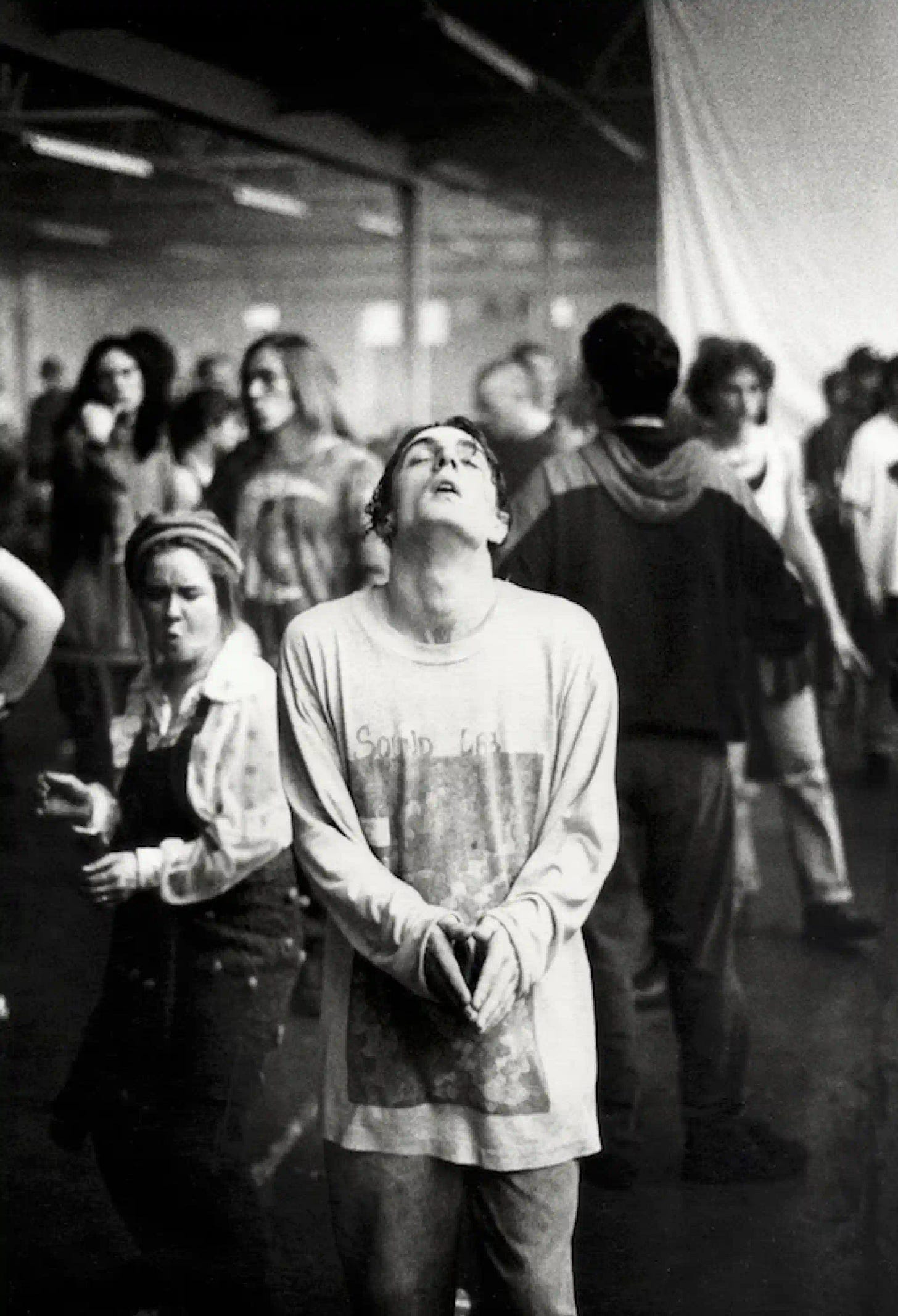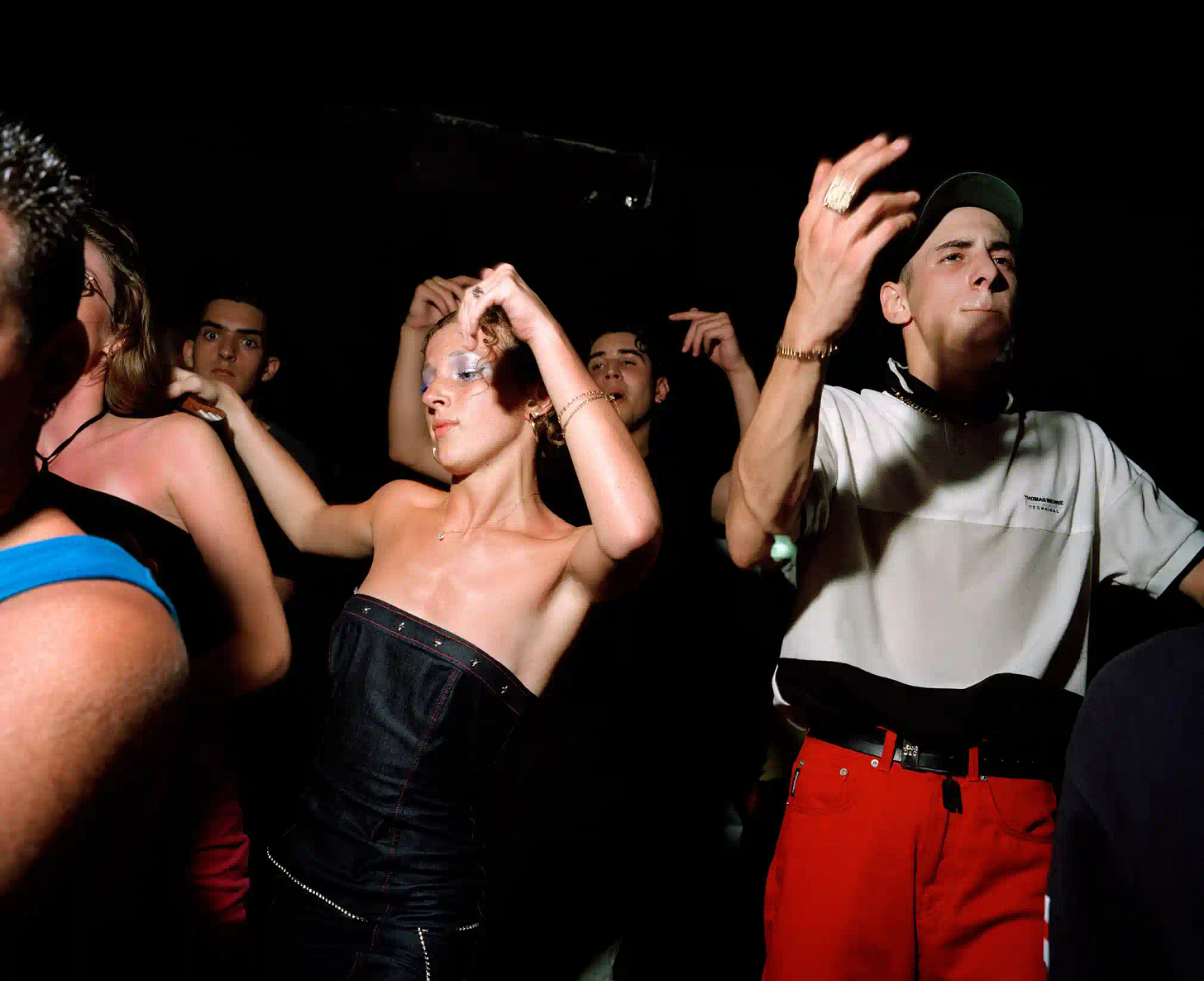On "The Intensive Care Unit Ballad" and the Post-Covid Conflict
Adam Lehrer's thoughts on the persistence of mask wearing, the desire to reclaim freedom, Umberto Eco, and JG Ballard's "The Intensive Care Unit Ballad"
The good thing about this fluid temporal moment between Covid and the world post-Covid is that it’s never been easier to identify friends and enemies. I went out this past weekend to see new work by Bradford Kessler, an artist and a friend. A more “based” than usual crowd, given the typical libtardery of the art world writ large, most of the attendees weren’t wearing masks (thus, friends). There were also, however, a few who insisted on still wearing them. From this, we can deduce that persistent mask wearing is driven by one or a couple of a few different psychological tendencies.
Some of the mask wearers are surely brutally propagandized into submitting to an arbitrary social control measure (which is something I am sympathetic towards, and thus am unwilling to write these people off all together, no one is perfect). Others, however, are more likely addicted to the appearance of morality and thus more likely to feign moral superiority during these otherwise bland social interactions. For them, the mask is worn to remind you that they are better than you. That they care about human life more than you. They are liars, to themselves worst of all, and are more dangerous. The third mask wearing tendency is most concerning to me: that some people might actually prefer life under lockdown to actual life. For them, life in liquid modernity is simply too terrifying and fraught to be endured, and sheltering inside is, for them, the rational response to the confused alienation that gnaws at them.
All of these tendencies, and especially the last of them, must be vigorously opposed. We must live, and remind those who have forgotten how that life is worth living. Accept your mortality. Accept the fact that you could walk outside and be gutted in the street. Take off the mask. Breathe in the air! Live!
In his essay, “Wave ciao ciao to the Camera,” writer Umberto Eco accurately theorizes that the prime virtue of this liquid society is to be seen, “People will be ready to do anything to be seen on television — or whatever will have replaced television by then — so as to be recognized by others and not to vegetate in a frightening and unbearable anonymity.” And yet, people were more seen during the Covid lockdowns than ever before. On their social media accounts and Tik Tok profiles, people — utterly disconnected from each other in any traditional sense of the word — found themselves ravenous for clicks and attention in cyberspace. Thus, it appears that the Covidian order of things is one perfect for exploiting the intrinsic alienation of a certain late capitalist subject. The lockdown was like a necromancer of the undead masses; give it a screen and a broadband connection and it will do whatever the necromancer commands it to do. So many among us have learned to love this artificial and inhuman existence and be fearful and contemptuous of us who long for something real. Art. Decadence. Love. Sex. We must free them of their jouissance-laden servitude.
I ended up in a conversation with one of those aforementioned masked attendees of Kessler’s exhibition, who was accompanying an unmasked friend. During that conversation, another artist friend of mine briefly became the subject of the exchange. The masked avenger said of this artist, something to the effect of: “I don’t know why he has to work in the way that he does, with all the bad stuff that’s happening in the world (in the interest of not hurting anyone’s feelings and the fact that most of these players aren’t public figures, I am going to leave identities obscured and no names will be mentioned here).”
While I was unsurprised by her statement given the presence of her facial appendage, I politely wigged out (a bit). “There has always been bad shit in the world,” I responded (something like that). “And never has it been an artist’s responsibility to create work that single-handedly addresses all the problems in the world. So what you’re really saying is that this artist makes you feel uncomfortable, and that you are too special to feel discomfort. You think you deserve a world without discomfort, and that we should all give up our own lives and our own desires and joie de vivres to deliver you the comfort that you believe you’re owed.”
Maybe I wasn’t quite so brutal, out of respect to the present friend, but close enough. This is the kind of binary conflict that we will find ourselves facing as society enters its post-Covid era. Because what this young woman was really expressing in her dismissal of the content of the discussed artist’s work was a resentment of that artist’s desire to live life deliciously. She was threatened by his will to power, and the authenticity in his expression. As someone who had resigned herself to the preference of comfort, feigned morality, and/or abstract safety over life, the discussed’s artist choice to assert his will upon the Earth through art is nothing short of an assault on her own sensibilities. The artist who expresses himself at all costs is an ally in the pursuit of freedom. More than that, he’s a hero. The people who choose to live life on their own terms in our present social political order are the heroes of our time. The person who denies that artist’s right to express himself at all costs is, yes, an enemy. But not an enemy beyond saving, mind you.
To some degree, conflicts between the left and the right, or Democrats and Republicans, or socialists and reactionaries will be less important than a more elemental and almost transcendent conflict between those who want to live and those who don’t. Between those who want to seize their joy and take ownership of their freedom and those who find freedom threatening to their safety and their comfort. A fault line has been drawn between people who must live at all costs and people who want to avoid those costs to the degree that they’re willing to sacrifice their own freedom. There’s a simplicity to this conflict. A clarity. And in liquid society, any clarity we can extrapolate is a gift.
I recently re-read JG Ballard’s story “The Intensive Care Unit Ballad” – a disturbingly prescient prophecy when read in a contemporary context. In a plot that will most certainly evoke your own life circa one year ago, the story depicts a society in which everyone lives entirely isolated and communicates only through TV screens (in a manner that suggests the webcams we now use daily). In this society, some people find themselves seduced and liberated by the absence of contact. “These admirable conventions eliminated all the dangers of personal involvement,” writes Ballard, “and this liberating affectlessness allowed those who so wished to explore the fullest range of sexual possibility and paved the way for the day when a truly guilt-free sexual perversity and, even, psychopathology might be enjoyed by all.”
And yet, the story’s protagonist finds himself powerfully compelled to transcend this world order. He and his wife Margaret — whom for years have managed to enjoy each other’s company through virtual dates, fell in love in the virtual space, and even had virtual children within that virtual space (though Ballard chooses not to explain how this copulation works) — decide that they want to go beyond their virtual love and actually reach out and touch one another. Somehow, the digital aestheticization of Margaret’s visage — Ballard describes Margaret’s virtual evolution as a mise-en-scène that rivals the likes of Hitchcock and Fellini’s depictions of female beauty — fail to satisfy his innate pining for human touch. Perhaps foreseeably, Margaret’s beauty fails to impress the protagonist upon their first physical meeting. She is both older and smaller than she appeared on screen. The awkwardness of their first meeting, however, does not thwart their innate curiosity for real contact.
During the husband and wife’s second meeting, and their first meeting with their children, the awkwardness and discomfort of reality overwhelms the family. Seemingly all of the disturbing familial drama that we experience slowly over an entire lifetime; resentment between mother and daughter, resentment between father and son, jealousy, rage, hostility, and insinuations of pedophiliac desire; bubble to the surface of the family’s dynamics immediately, erupting in a violent confrontation. And as the father bashes his son’s brains in, and prepares to crush the neck of the victor of the bloody battle between his wife and daughter, he is full of love. He’s never felt more alive. We must then ask ourselves: is a world free of discomfort better than a world where we feel the full extent of our flesh and blood existence? Better than to know that we have a soul and that we are capable of love? “Smiling at them affectionately, rage thickening the blood in my throat, I am only aware of my feelings of unbounded love,” writes Ballard.
It’s already clear that as we transition back to corporeal existence — as we go outside and feel the closeness and heat of our bodies together — we will know strife and discomfort. Predictably, the technocrats who scolded and judged us for our resistance to being forced inside and robbed of a zestful life are now scolding and judging us for having laughs at the expense of those who still wear masks despite being vaccinated – and thus, are utterly incapable of contracting the virus. In response to a tweet posted by Genéve Campbell (full disclosure: a friend who I can verify is as purely intentioned as anyone on that cesspool of a site can be) in which Campbell lamented the number of fully vaccinated people still living in terror over a virus they can no longer contract, former New Yorker fact checker (though fired for “mistakenly” claiming that an ICE agent had a Nazi tattoo, so good thing that rag’s fact checkers have no clear detectable ideological allegiances...), writer, and apparent sword fetishist Talia Levin responded: “I think expecting people to instantly give up on 15 months of fundamental changes to their behavior and lives, and pathologizing and mocking any hesitancy, is unrealistic, cruel and frankly bizarre.” Of course, now that humans must reenter the world; a world that is equally full of splendor AND danger; the discourse cops are trying to slow down the process of reentry with all the malevolent digital tools they have at their disposal.
Given that Levin was utterly contemptuous of those who were hesitant about changing the behavior that they had engaged in their entire lives before March 2020 (calling many of those who protested lockdowns “fascists” no doubt), we can conclude that her empathy is, at the very least, one-sided and utterly self-serving. But given that she’s a vulgar technocrat, we can also read Levin’s statement as affirmation that people’s hesitancy to go back outside and reclaim their freedom is beneficial to state power. A population that refuses to claim its freedom is a population that is hyper-vulnerable to having those freedoms stripped of them. “Believe Science” has become a loaded and menacing phrase when deconstructed, given that it can be conversely translated as, “Obey your masters, and stay THE FUCK inside, peasants.”
As Geoff Shullenberger observes in his excellent recent text on Foucault and biopolitical power during the Covid-era: “During the pandemic, the delegation of decisions to public health experts has entailed a dramatic expansion of state authority and abrogation of basic rights, most notably freedom of speech and assembly.” But this massive expansion of state power has been legitimized by the fact that so many people prefer to live a sanitized existence – free of risk, and free of vigor. The hardening of the surveillance state has been led by the masked zombies and their fetish for some vague notion of safety that probably doesn’t exist anyways. You will never be safe! And your insistence that you deserve an irrational safety is eroding the most fundamental dimensions of being a fucking human being.
I called this website Safety Propaganda because safety propaganda is the state of the world we live in. Safe spaces. Safety protocols. Safety seminars. But safety is an abstraction, life is real! I choose life. But resistance is not futile. On the contrary, resistance has never been easier. In all likeliness, we will not see the proletarian revolution any time soon and maybe not even in our lifetimes. But we know exactly who our short term enemies are: the mask fetishists. They must be opposed, but not with violence. With tenderness. With openness. We must remind the fearful and anxious what freedom looks like, and every exultation of the human spirit is now an act of resistance to the prevailing cultural mood. It’s beautiful and glorious! Go into a crowded bar and dance to your favorite music! Resist! Take MDMA and kiss someone who you think is beautiful! Resist! Go to the people you love and hold them tight. There is no more virus. There is nothing to fear. You know it. I know it. To change the world we must face its violence, brutality, ugliness, and incalculable risks and say: “I do not care, life is still worth living!” To resist the new global order, we must make the world beautiful! Beauty is complex, and shit – complexity is always preferable to fraudulence.
ILLUSTRATIONS
1. photo by Derek Ridgers
2. Umberto Eco
3. JG Ballard
4. Talia Levin
5. photo by Ewen Spencer









Love this! (although must point out that the vaccine doesn't stop people getting c19. There have even been suggestions from the more paranoid and conspiratorial among us that some outbreaks, such as India, are happening *after* mass vaccinations but I haven't looked into that).
But anyway, whatever. Yes, I hope many people are laughing in the face of the death we actually think we can control, and sticking their tongues right down each other's throats :)
Masks. Lehrer’s insights into the “persistence of mask wearing” come free of any journalistic facts. Instead, Lehrer tackles the topic from an aesthetic perspective, claiming that mask-wearers are “necromancers,” “masked zombies,” and the “undead masses,” as if he were reciting the lyrics of a Misfits song. It is juvenile. And while Lehrer acts impatient with everyone still wearing a mask in late May 2021, the weekend that Lehrer describes was one of the first in which vaccinated people could go without a mask indoors in New York City under revised guidance. At that time, approximately 50% of the population of New York City was vaccinated. Thus one would have expected even more people at Lehrer’s party to be wearing marks. What exactly is he complaining about?
On a broader political level, Lehrer says that COVID shows that the capitalists want to keep the “peasants” inside. But the “peasants” were outside during COVID, not inside. Indeed, it was the capitalists who pushed essential workers outside at great risk to worker safety, and the government refused to provide them with the support that would allow workers to sit it out, forcing them back into the arms of capital. This took place as white-collar workers carried on remotely from the safety of their homes, and the superrich barricaded themselves off in their own worlds. Reality does not fit his metaphor.
Lehrer references the Twitter feed of his friend Genève Campbell, whom he calls the most “purely intentioned” person on Twitter. Campbell is Georgetown University, undergraduate and postgraduate, and works at a Harvard University affiliate on grants from the State Department and the U.S. Agency for International Development. Her background is, in her own words, in “democratization,” mostly science and technology policy as implemented in U.S. government-funded programs: “your general U.S.-funded regime change type of soft power stuff.” Her Leftist credentials extend all the way back to the fact that she has “never voted for a Republican.” It is laughable that Lehrer, who loves to call everything “Psyops!” and accuses everyone of being “CIA-funded,” is taking cues from a softcore regime-change specialist whose work has been “mostly” overseas. Lehrer is exactly the kind of knucklehead who would have brought the undercover FBI agent to the Panthers meeting in the 1960s.
In any case, Campbell’s Twitter life is as a COVID commentator and anti-mask influencer who leads a bevy of angry soccer parents and would-be COVID policy wonks who rail against mask mandates and the teacher’s union and demand that in-person school be reopened immediately.
While Campbell plays the role of an objective truth-teller, her tweets, retweets and threads, and those of her most active followers, all amplify the same theme. First, they note some misstep, foible, idiocy or overreaching in the area of mask mandates or vaccination; then everyone jumps to apocalyptic conclusions, talking about hostage situations, human rights crimes, how lockdowns and mask mandates are evil, and how history will judge us. Campbell likes to talk about “moral panic,” but her threads are pretty panicky themselves. And as you might imagine, there is a lot of privilege. Of all the dangers and injustices plaguing this planet, they are interested almost exclusively in mask mandates and vaccinations as an imposition on their sense of freedom and normalcy. Indeed, some are now “one-issue voters,” expressing admiration for people like Ron DeSantis. As a Leftist, I’ll pass.